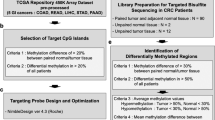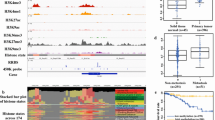Abstract
Background
Shisa3 is a novel tumor suppressor identified in lung cancer. However, its antitumor activity in other human cancers and the mechanism of gene inactivation remain unknown.
Methods
SHISA3 expression was measured by reverse transcription-PCR (RT-PCR) and quantitative RT-PCR (RT-qPCR). DNA methylation was determined by bisulfite sequencing and pyrosequencing.
Results
Down-regulation of SHISA3 expression was observed in all of 11 colorectal cancer (CRC) cell lines and was further confirmed in 34 (65.4 %) of 52 colorectal carcinomas by RT-qPCR. Four of six CRC cell lines could restore SHISA3 expression after treatment with 5-aza-2′-deoxycytidine. Tumor-specific methylation of five CpG sites in the first intron of SHISA3 was identified by bisulfite sequencing, and their methylation levels were quantified in 127 pairs of primary CRC tissues by bisulfite pyrosequencing. The methylation levels of SHISA3 in tumors were noticeably higher than that in their matched normal mucosae. In addition, SHISA3 hypermethylation was significantly associated with an increased risk of disease recurrence in patients with stage II and III disease (P = 0.007) and was an independent predictor of poor overall survival [hazard ratio (HR) 2.9, 95 % confidence interval (CI) 1.5–5.8; P = 0.002] and disease-free survival (HR 4.0, 95 % CI 1.6–10.2; P = 0.003) of CRC patients.
Conclusions
SHISA3 gene is epigenetically inactivated in a substantial fraction of CRC, and its hypermethylation is of prognostic significance in predicting clinical outcome. The quantitative bisulfite pyrosequencing assay established could be a cost-effective tool for providing a potential biomarker of adverse prognosis in CRC.




Similar content being viewed by others
References
Fearon ER, Vogelstein B. A genetic model for colorectal tumorigenesis. Cell. 1990;61:759–67.
Markowitz SD, Bertagnolli MM. Molecular origins of cancer: Molecular basis of colorectal cancer. N Engl J Med. 2009;361:2449–60.
van Engeland M, Derks S, Smits KM, Meijer GA, Herman JG. Colorectal cancer epigenetics: complex simplicity. J Clin Oncol. 2011;29:1382–91.
Perea J, Lomas M, Hidalgo M. Molecular basis of colorrectal cancer: towards an individualized management? Rev Esp Enferm Dig. 2011;103:29–35.
Duffy MJ, O’Donovan N, Crown J. Use of molecular markers for predicting therapy response in cancer patients. Cancer Treat Rev. 2011;37:151–9.
Furushima K, Yamamoto A, Nagano T, et al. Mouse homologues of Shisa antagonistic to Wnt and Fgf signalings. Dev Biol. 2007;306:480–92.
Pei J, Grishin NV. Unexpected diversity in Shisa-like proteins suggests the importance of their roles as transmembrane adaptors. Cell Signal. 2012;24:758–69.
Yamamoto A, Nagano T, Takehara S, Hibi M, Aizawa S. Shisa promotes head formation through the inhibition of receptor protein maturation for the caudalizing factors, Wnt and FGF. Cell. 2005;120:223–35.
Katoh Y, Katoh M. Comparative genomics on Shisa orthologs. Int J Mol Med. 2005;16:181–5.
Silva AC, Filipe M, Vitorino M, Steinbeisser H, Belo JA. Developmental expression of Shisa-2 in Xenopus laevis. Int J Dev Biol. 2006;50:575–9.
Filipe M, Goncalves L, Bento M, Silva AC, Belo JA. Comparative expression of mouse and chicken Shisa homologues during early development. Dev Dyn. 2006;235:2567–73.
Hedge TA, Mason I. Expression of Shisa2, a modulator of both Wnt and Fgf signaling, in the chick embryo. Int J Dev Biol. 2008;52:81–5.
Zhu Y, Tsuchida A, Yamamoto A, et al. Expression and roles of a xenopus head-forming gene homologue in human cancer cell lines. Nagoya J Med Sci. 2008;70:73–82.
Chen CC, Chen HY, Su KY, et al. SHISA3 Is Associated with Prolonged Survival through Promoting beta-Catenin Degradation in Lung Cancer. Am J Respir Crit Care Med. 2014;190:433–44.
Tsai MH, Fang WH, Lin SW, Yen SJ, Chou SJ, Yang YC. Mitochondrial genomic instability in colorectal cancer: no correlation to nuclear microsatellite instability and allelic deletion of hMSH2, hMLH1, and p53 genes, but prediction of better survival for Dukes’ stage C disease. Ann Surg Oncol. 2009;16:2918–25.
Tzeng ST, Tsai MH, Chen CL, et al. NDST4 is a novel candidate tumor suppressor gene at chromosome 4q26 and its genetic loss predicts adverse prognosis in colorectal cancer. Plos One. 2013;8:e67040.
Livak KJ, Schmittgen TD. Analysis of relative gene expression data using real-time quantitative PCR and the 2(-Delta Delta C(T)) Method. Methods. 2001;25:402–8.
Li LC, Dahiya R. MethPrimer: designing primers for methylation PCRs. Bioinformatics. 2002;18:1427–31.
Knudson AG, Jr. Mutation and cancer: statistical study of retinoblastoma. Proc Natl Acad Sci USA. 1971;68:820–3.
Fevr T, Robine S, Louvard D, Huelsken J. Wnt/beta-catenin is essential for intestinal homeostasis and maintenance of intestinal stem cells. Mol Cell Biol. 2007;27:7551–9.
Kim BM, Mao J, Taketo MM, Shivdasani RA. Phases of canonical Wnt signaling during the development of mouse intestinal epithelium. Gastroenterology. 2007;133:529–38.
Reya T, Clevers H. Wnt signalling in stem cells and cancer. Nature. 2005;434:843–50.
Humphries A, Wright NA. Colonic crypt organization and tumorigenesis. Nat Rev Cancer. 2008;8:415–24.
Jones PA. DNA methylation errors and cancer. Cancer Res. 1996;56:2463–7.
Jones PA, Baylin SB. The fundamental role of epigenetic events in cancer. Nat Rev Genet. 2002;3:415–28.
Luo Y, Wong CJ, Kaz AM, et al. Differences in DNA methylation signatures reveal multiple pathways of progression from adenoma to colorectal cancer. Gastroenterology. 2014;147:418–29 e8.
Toyota M, Issa JP. CpG island methylator phenotypes in aging and cancer. Semin Cancer Biol. 1999;9:349–57.
Toyota M, Ahuja N, Ohe-Toyota M, Herman JG, Baylin SB, Issa JP. CpG island methylator phenotype in colorectal cancer. Proc Natl Acad Sci USA. 1999;96:8681–6.
Hanahan D, Weinberg RA. Hallmarks of cancer: the next generation. Cell. 2011;144:646–74.
Grady WM, Carethers JM. Genomic and epigenetic instability in colorectal cancer pathogenesis. Gastroenterology. 2008;135:1079–99.
Harrison S, Benziger H. The molecular biology of colorectal carcinoma and its implications: a review. Surgeon. 2011;9:200–10.
Walther A, Johnstone E, Swanton C, Midgley R, Tomlinson I, Kerr D. Genetic prognostic and predictive markers in colorectal cancer. Nat Rev Cancer. 2009;9:489–99.
Jao TM, Tsai MH, Lio HY, et al. Protocadherin 10 suppresses tumorigenesis and metastasis in colorectal cancer and its genetic loss predicts adverse prognosis. Int J Cancer. 2014; 135:2593–603.
Acknowledgment
The study was supported by Grants from the National Science Council, Executive Yuan (NSC 102-2320-B-002-017), the Cardinal Tien Hospital (CTH-102-1-2A02) and the National Health Research Institutes (NHRI-EX103-10136BI), Taiwan.
Disclosure
No potential conflicts of interest exist.
Author information
Authors and Affiliations
Corresponding author
Additional information
Ming-Hong Tsai and Wen-Chi Chen contributed equally to this study and share co-first authorship.
Electronic supplementary material
Below is the link to the electronic supplementary material.
Rights and permissions
About this article
Cite this article
Tsai, MH., Chen, WC., Yu, SL. et al. DNA Hypermethylation of SHISA3 in Colorectal Cancer: An Independent Predictor of Poor Prognosis. Ann Surg Oncol 22 (Suppl 3), 1481–1489 (2015). https://doi.org/10.1245/s10434-015-4593-1
Received:
Published:
Issue Date:
DOI: https://doi.org/10.1245/s10434-015-4593-1




